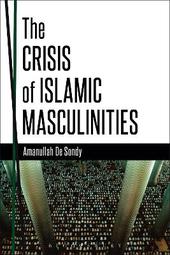
|
The Crisis of Islamic Masculinities
Paperback / softback
Main Details
| Title |
The Crisis of Islamic Masculinities
|
| Authors and Contributors |
By (author) Dr. Amanullah De Sondy
|
| Physical Properties |
| Format:Paperback / softback | | Pages:248 | | Dimensions(mm): Height 234,Width 156 |
|
| Category/Genre | Islamic life and practice |
|---|
| ISBN/Barcode |
9781472587145
|
| Classifications | Dewey:297.0811 |
|---|
| Audience | | Undergraduate | | Postgraduate, Research & Scholarly | |
|---|
|
Publishing Details |
| Publisher |
Bloomsbury Publishing PLC
|
| Imprint |
Bloomsbury Academic
|
| Publication Date |
20 November 2014 |
| Publication Country |
United Kingdom
|
Description
Discussions and debates surrounding Islamic masculinities are quickly finding their place in the study of Islam and Muslims. Now available in paperback, The Crisis of Islamic Masculinities makes a vital contribution to this emerging field. Rigid notions of masculinity are causing crisis in the global Islamic community. These are articulated from the Qur'an, its commentary, historical precedents and societal, religious and familial obligations. Some Muslims who don't agree with narrow constructs of manliness feel forced to consider themselves secular and therefore outside the religious community. In order to evaluate whether there really is only one valid, ideal Islamic masculinity, The Crisis of Islamic Masculinities explores key figures of the Qur'an and Indian-Pakistani Islamic history, and exposes the precariousness of tight constraints on Islamic manhood. By examining Qur'anic arguments and the strict social responsibilities advocated along with narrow Islamic masculinities, Amanullah De Sondy shows that God and women (to whom Muslim men relate but are different from) often act as foils for the construction of masculinity. He argues the constrainers of masculinity have used God and women to think with and to dominate through and that rigid gender roles are the product of a misguided enterprise: the highly personal relationship between humans and God does not lend itself to the organization of society, because that relationship cannot be typified and replicated.
Author Biography
Amanullah De Sondy is Assistant Professor of Islamic Studies at the University of Miami, Florida, USA.
ReviewsThe Crisis of Islamic Masculinities shows how any notion of Muslim or Islamic masculinity is always constructed against a number of "others" - women, the West and God ... This is an important work for those interested in gender relations in Muslim societies. I only wish that my students could read English because this work would help them to explore a broader range of gender constructions without the (fully justifiable) fear of being labelled un-Islamic. -- Julia Droebner, An-Najah National University * Times Higher Education * This book might be of interest to scholars working on various areas including but not limited to gender, Islam, and feminism. In summary, it is a useful book for the library. -- Nazli Alimen, London College of Fashion, University of the Arts London * Gender, Place & Culture: A Journal of Feminist Geography * Ultimately, De Sondy does not aim to uncover one specific definition of true Islamic masculinity, but, rather, to explore the different ways in which Muslims have understood masculinity ... The Qur'anic chapter is particularly interesting, insofar as De Sondy feels that the Qur'an is inconclusive with respect to uncovering a single definition of masculinity, since many Qur'anic male figures - such as Adam, Jesus, Joseph, and the Prophet Muhammad - lived significantly different lives. -- Amina Inloes, The Islamic College, London * Journal of Shi'a Islamic Studies, 7.3 * The Crisis of Islamic Masculinities, provides a timely addition to the emergent field of masculinity studies ... De Sondy has produced an inclusive and pluralistic vision of Islamic masculinities that accommodates polar opposite exemplars such as Mawdudi and Mirza Ghalib, that argues that the diversity of Qur'anic masculine paradigms must themselves be taken as proof that Islam does not support a single model of masculinity, and which offers a cogent analysis of the multiple positions Muslim women feminists have adopted and the methods they have employed to remain "pro-faith" while debunking the hegemonic discourses of Islamic traditions ... A beautifully written ... and well documented study that should be read not only by those interested in gender in Islam but by anyone interested in gender and masculinity issues more broadly. -- Linda G. Jones, Universitat Pompeu Fabra, Spain * Society for Contemporary Thought and the Islamicate World Review * De Sondy does a fine job in illuminating the role of a foundational text such as the Qur'an in shaping notions of masculinity while at the same time avoiding over-determining scripture's role in this process. Equally, in order to avoid the pitfalls of generalizing about Muslim men worldwide, he focuses his analysis on case studies from the Indian subcontinent between the eighteenth and twentieth centuries ... beautifully written ... and well documented study that should be read not only by those interested in gender in Islam but by anyone interested in gender and masculinity issues more broadly. -- Linda G. Jones, Universitat Pompeu Fabra * SCTIW Review * This book opens the way to rethinking what it means to be a man in the Islamic tradition, showing the intricate ways in which constructions of femininity and masculinity are intertwined. It is a must-read for those wishing to understand the Islamists' obsession with sexuality, their rejection of gender equality, and their invocation of religious dogma as the basis for gender rights. -- Ziba Mir-Hosseini, Centre for Islamic and Middle Eastern Law, SOAS, UK. De Sondy makes an original and rich contribution to the burgeoning literature on Islamic masculinities while engaging productively with Muslim feminist thought. -- Kecia Ali, Associate Professor of Religion, Boston University, USA. The study of Muslim masculinities is in its infancy, and The Crisis of Islamic Masculinities easily succeeds in laying a secure foundation for this highly significant but neglected field - a major step forward. -- Ahmet T. Karamustafa, Professor of History, University of Maryland, USA.
|